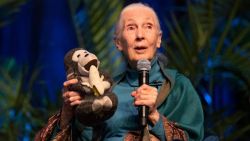Jane Goodall
Overview
Jane Goodall (born April 3, 1934) is a world-renowned British primatologist, ethologist, and environmentalist best known for her pioneering study of wild chimpanzees in Tanzania. She revolutionized primatology by discovering that chimpanzees make and use tools — a trait once believed to be uniquely human.
Goodall is also a passionate conservationist, advocate for animal welfare, and founder of the Jane Goodall Institute.
Early Life
Born in London, Goodall showed a love for animals and nature from a young age. Her dream of working with wildlife began in childhood, inspired by books like *Tarzan* and *The Story of Doctor Dolittle*.
Career and Discoveries
In 1960, Jane Goodall traveled to the Gombe Stream Reserve in Tanzania under the mentorship of anthropologist Louis Leakey. Without formal scientific training at the time, she used patient observation and field immersion, eventually documenting:
- Chimpanzees using grass stalks to extract termites (tool use)
- Complex social behaviors, including affection, dominance, and warfare
- Individual personalities among chimpanzees
Her findings challenged previous scientific understanding of the line between humans and animals.
Academic Recognition
Despite having no undergraduate degree, Goodall earned a Ph.D. from the University of Cambridge in 1965, becoming one of the few to do so based on field research alone.
Jane Goodall Institute
Founded in 1977, the Jane Goodall Institute promotes:
- Wildlife conservation and habitat protection
- Community-led sustainable development
- Environmental education through the global Roots & Shoots youth program
Activism and Advocacy
Goodall is a lifelong advocate for:
- Animal rights and ethical treatment
- Environmental protection and climate action
- Global education and youth leadership
She has traveled extensively, delivering lectures, writing books, and serving as a **UN Messenger of Peace** since 2002.
Awards and Honors
Jane Goodall has received numerous accolades, including:
- **Dame Commander of the Order of the British Empire (DBE)**
- **Kyoto Prize (1990)**
- **Tyler Prize for Environmental Achievement**
- **Templeton Prize**
- Numerous honorary doctorates and global environmental awards
Legacy
Goodall’s legacy extends beyond science. Her life’s work has inspired generations to connect with nature, respect wildlife, and take action for the planet. She remains an iconic voice in conservation and humanitarian efforts.
Selected Publications
- In the Shadow of Man (1971)
- Reason for Hope: A Spiritual Journey (1999)
- The Book of Hope: A Survival Guide for Trying Times (2021)

